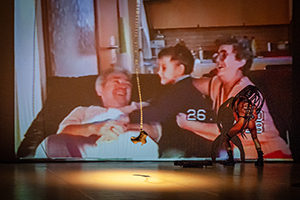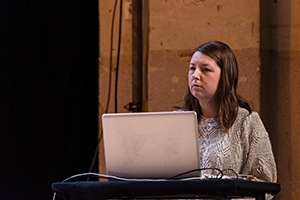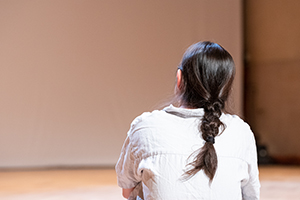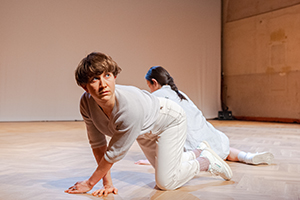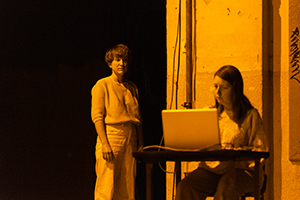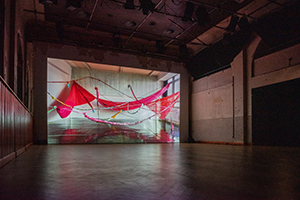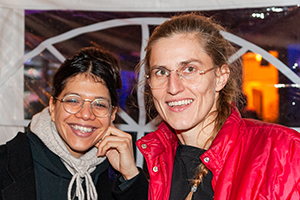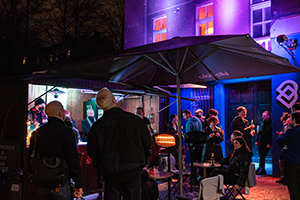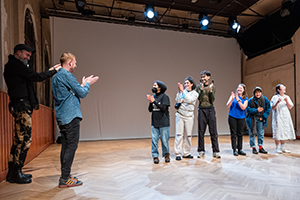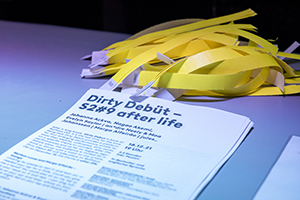On Death
Jazmina Figueroa
The following is a string of themes, that came about as reflections written alongside the four performances by Nagao Akemi in collaboration with Johanna Ackva and Evelyn Saylor, Moa Johansson and An*dre Neely, ALFEiRAO, and Julian Petru Fricker. These works were shown on December 18, 2021, in Berlin and were developed under the notion of the afterlife...
On Death
Jazmina Figueroa
The following is a string of themes, that came about as reflections written alongside the four performances by Nagao Akemi in collaboration with Johanna Ackva and Evelyn Saylor, Moa Johansson and An*dre Neely, the duo Marga Alfeirão with Myriam Lucas, and Julian Petru Fricker. These works were shown on December 18, 2021, in Berlin and were developed under the notion of the afterlife.
The performances at Dirty Debüt sparked an intimate preoccupation with death. Death, as a strand of life.
You might say: Death becomes her!
On afterlife
Death itself is arbitrary. Yet, it is a guaranteed terrific blow. We live up to then transpire from death. Whether the death is fierce, bureaucratic, or emotional, the event is unfailingly burdened by a resonating effect.
When death is incidental, as it ought to be, it will swell into this massive upshot for those of us living – as it ought to. A merited swelling, the qualities of death’s afterlife.
On cycles
The hereafter has the greatest impact on our kindred. As they endure fantastic images of us hereafter, we are subjected to an after. Suppose the phrase, Life after death gives off some impression of tendrils, potent but made from no particular sustenance. The phrase then might accommodate this image of swirling movements muffled, murky, arranged into a private sphere of semiosis and symbols. Therein, over such small instances, spawns an activated force working through its coincidental and streamlined flows. Gestures and reverie are minuscule, in comparison, but effective.
“The only discernible stabilities in Relation have to do with the interdependence of the cycles operative there, how their corresponding patterns of movement are in tune. [...] Thought makes music.”
-Édouard Glissant, Poetics of Relation, translated by Betsy Wing
Glissant’s work came to mind during the opening piece by Marga Alfeirão with Myriam Lucas titled, lounge. lounge is a staging of detailed and tiny movements happening primarily at the midsection of each performer’s body, concentrated gyrations oft-sexualized by euro-canons. In witnessing the swaying pulsating pressure arising from their initial leisurely states of being, I wanted to chant out loud, “aye... aye!” To acknowledge the thrumming cadence before us. However, to match this simmering magnitude, that never arrived at its peak, my intended chant was set aside to a measured mummer.
Glissant wrote about relations as cyclical, repetitive, and curving towards or aside some chaos- climax. The relation indicates a sort of willingness to flow into another easily, similar to shock absorbers.
Stop and go.
On exchange
When intimate exchanges are undecipherable to an audience, as they were in Grandmothers by Nagao Akemi in collaboration with Johanna Ackva and Evelyn Saylor, they will be perceived in haste.
Overheard were remnants of conversations that happened elsewhere. Gratifyingly distant or producing a sense of awkward frustration if we, the audience, attempted to listen in on the conversations. So we collectively give in, to such a display of familial intimacies, one’s apparitions are leftover for us to disambiguate (or can be left behind). In harnessing the intimacies around exchange, lies the innate capacity for giving and receiving from another.
I suppose it helps to think of these exchanges as an impact, like a collision, resulting in a high- pitched ringing in your ear. According to some superstitious beliefs, the ringing will return when someone remembers you.
On linkages
...and the work by Moa Johansson and An*dre Neely, with echoes filling up the orbit, but damaged.
“Scenes never rest, but are reconfigured within, dispersed across, and threaded through one another.”
-Karan Barad, Quantum Entanglements and Hauntological Relations of Inheritance: Dis/ continuities, SpaceTime Enfoldings, and Justice-to-Come
“Until the rainbow burns the stars out in the sky Until the ocean covers every mountain high
Until the dolphin flies and parrots live at sea
Until we dream of life and life becomes a dream Until the day is night and night becomes the day Until the trees and seas just up and fly away Until the day that eight times eight times eight is four Until the day that is the day that are no more
Until the day the earth starts turning right to left Until the earth just for the sun denies itself
Until dear Mother Nature says her work is through Until the day that you are me and I am you”
- Stevie Wonder, As
On recollection
What is so alluring about eternal rest after all? Putting the past to rest? Over and over again, the threshold to the afterlife is deliberately depicted as tantalizing.
And without recollection, how could one undergo such incurable longings and desires? Recollections are necessary to touch on or go within. Harrowing as it is soothing, recollection is at odds with suffering.
In the metamorphic presentation, The Liminoid by Julian Petru Fricker we see recollection as different manifestations that keep us tethered to archives of selfhood –– an embodiment and display of the bittersweet expression, “To kill your darlings.”
On death and quietus
My mom works with people that are in the last stages of their lives. Death surrounds her.
She spends a lot of energy on providing comfort and all the organizational tasks leading up to the moment of one’s passing, work understood as care-taking. In assisted living residences, medical staff is monitoring machines that beep around the clock. The beep signifies a beating heart. When that beep lengthens into a dial tone-like sound, the staff then understands that the lungs are no longer circulating air, the heart has stopped beating, and the life force has ended. It happens all the time in her work, and then the proper arrangements take place — the administrative afterward.
A few will be ferociously changed by this moment but most will not.







